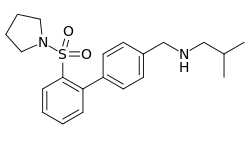PF-4455242
PF-4455242 is a selective, short-acting (non-"inactivating") antagonist of the κ-opioid receptor.[1][2] Discovered by Pfizer in 2009, it was pursued in a phase I clinical trial for the treatment of bipolar disorder,[3] and was also investigated as a treatment for depression and substance abuse.[4] However, development was stopped in September 2010 due to toxicology findings in animals that had been exposed to the drug for three months.[3]
 | |
| Clinical data | |
|---|---|
| Routes of administration | Oral |
| ATC code |
|
| Identifiers | |
IUPAC name
| |
| CAS Number | |
| PubChem CID | |
| ChemSpider | |
| CompTox Dashboard (EPA) | |
| Chemical and physical data | |
| Formula | C21H28N2O2S |
| Molar mass | 372.524 g/mol g·mol−1 |
| 3D model (JSmol) | |
SMILES
| |
InChI
| |
References
- Verhoest PR, Basak AS, Parikh V, et al. (August 2011). "Design and discovery of a selective small molecule κ opioid antagonist (2-methyl-N-((2'-(pyrrolidin-1-ylsulfonyl)biphenyl-4-yl)methyl)propan-1-amine, PF-4455242)". J. Med. Chem. 54 (16): 5868–77. doi:10.1021/jm2006035. PMID 21744827.
- Melief EJ, Miyatake M, Carroll FI, et al. (November 2011). "Duration of action of a broad range of selective κ-opioid receptor antagonists is positively correlated with c-Jun N-terminal kinase-1 activation". Mol. Pharmacol. 80 (5): 920–9. doi:10.1124/mol.111.074195. PMC 3198912. PMID 21832171.
- Zoran Rankovic; Richard Hargreaves; Matilda Bingham (2012). Drug Discovery for Psychiatric Disorders. Royal Society of Chemistry. pp. 314–317. ISBN 978-1-84973-365-6.
- Charlotte Allerton; David Fox (2013). Pain Therapeutics: Current and Future Treatment Paradigms. Royal Society of Chemistry. p. 50. ISBN 978-1-84973-645-9.
This article is issued from
Wikipedia.
The text is licensed under Creative
Commons - Attribution - Sharealike.
Additional terms may apply for the media files.